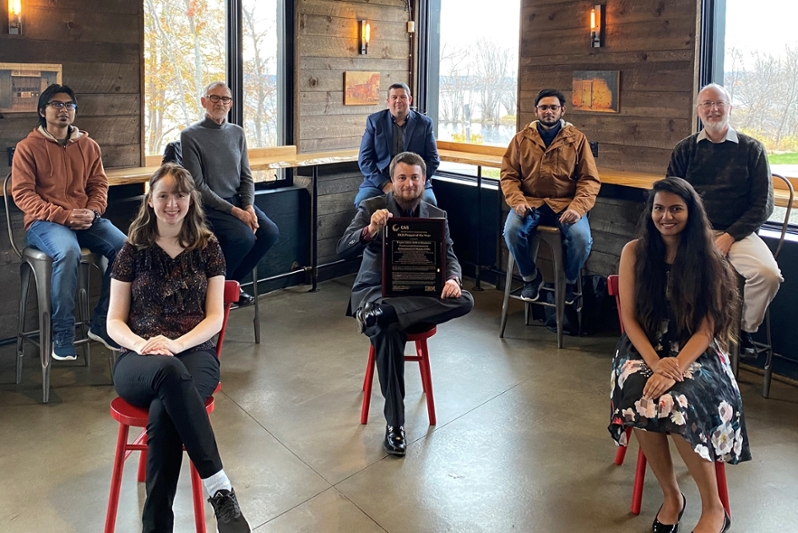UNB research team awarded IBM CAS 2020 Project of the Year
Author: UNB Research
Posted on Apr 7, 2021
Category: Research , Partnerships , Accolades , Innovation & Commercialization

University of New Brunswick students in the faculty of computer science and professor Dr. Kenneth Kent were awarded the 2020 Project of the Year Award by the IBM Center for Advanced Studies for Project 1035: OMR in Resource Constrained Environments (Embedded/ IoT/ Mobile OMR).
The project is the second largest ever conducted by the Centre of Advanced Studies –Atlantic (CAS–Atlantic).
The research team successfully enabled numerous existing, non-native applications to run on the ARM64 platform using Eclipse’s OpenJ9 Java virtual machine
Virtual machines act as an intermediary platform for running applications on different hardware than originally designed.
“By conducting the work and the research that we have, what we've effectively done is enabled a plethora of applications that already exist to run on this hardware, and it makes applications that are capable of running in numerous environments much more possible,” said Mr. Graham.
“For example, the application that you're running on your server that's doing some banking application. That application can now run on your mobile phone using that virtual machine. The research has enabled applications to be supported on a lot more devices.”
ARM64 processors are CPUs, like Intel or AMD, but are designed for embedded devices requiring low power – such as sensory and Internet-of-Things devices. Embedded computers are commonly seen in mobile phones, tablets, controllers, automobiles and refrigerators. These devices are all designed to be more efficient/compact and have a longer battery life.
In recent years, ARM64 processors have skyrocketed in popularity since the rise of Apple and Android devices. Embedded devices have become more complicated as more functionality is added over time; the switch to a 64-bit architecture supports the needs of the more complex and precise embedded devices being manufactured.
For example, a car’s infotainment system used to be a radio. Over time, it evolved into an mp3 player, and today, most car infotainment systems include a large display, GPS, audio and video capability.
When the team proposed and launched the project five years ago, they wanted to pioneer efforts to take advantage of this emerging hardware.
“We were looking to get on that wave even before other major players were interested in proliferating this type of architecture,” said Mr. Graham.
Their project enabled IBM to provide solutions on servers, desktops and the embedded market.
The team has also produced a working prototype which is being commercially used by some clients of IBM, and are currently working to further optimize it. These performance enhancements will allow applications to run more efficiently on devices and help extend battery life.
The software development and virtual machine were done on the Eclipse OpenJ9 open-source Java platform, which was provided by IBM.
Open source allowed the software to be freely available for people to work with the source code, supporting more effective knowledge transfer.
The team consisted of three undergraduate co-op students and six master’s students who were mentored by Aaron Graham, research assistant for CAS-Atlantic and part-time master's student who has worked on the project since its inception. The project also included two staff members and two faculty members at UNB.
With this research tied to an industrial partner, IBM, it provided students with an opportunity to work directly with this commercial product every day.
“Together as a team, we've received this award, which is excellent, and the students definitely deserve most of this credit,” said Mr. Graham.
The research team was supervised by Dr. Kenneth Kent, who established the high-level design considerations and led the interaction with IBM and assisted by Dr. Gerhard Dueck.
“Every piece of code that the students wrote, and every research idea they developed, tested and contributed was all directly fed into the IBM process. The students had an opportunity to do the research, as well as an opportunity to explore the commercialization side of it to make sure their findings and contributions were of commercial quality,” said Dr. Kent.
The project also involved collaborators with the IBM Runtime Technologies team based in Markham and Tokyo, Japan. UNB will be continuing the collaboration with IBM for another three years and exploring additional projects in the future.
The project is funded by the Atlantic Canada Opportunities Agency, the New Brunswick Innovation Foundation, IBM Canada and the IBM Centers for Advanced Studies.
Dr. Kenneth Kent is a professor in the faculty of computer science, Assistant Dean (Research and Outreach), and the Director of the Centre for Advanced Studies - Atlantic. He was recently named NBIF’s 2020 Star Mentor.
Aaron Graham is a research assistant for CAS-Atlantic, a part time master's student, a software developer and the systems administrator of UNB’s LinuxOne Rockhopper II mainframe that was acquired from IBM.
Read more about the project and the award at the links.
Story written by Kesang Deker.
More information
Dr. Kenneth Kent (orcid)| Faculty of Computer Science| Centre for Advanced Studies - Atlantic | Research at UNB | Graduate Studies at UNB